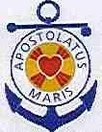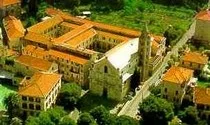introduction
A.O.S. APOSTLESHIP OF THE SEA – APOSTOLATUS MARIS (Stella Maris)
History and Organisation
The Apostleship of the Sea is the Catholic Church’s Missionary work to the seafarers whether they be on merchant, passenger, war or fishing vessels. While the Church has always been interested in seafarers since Christ first gathered his fishermen-disciples around him, the modern movement began in the 1890s with several isolated and independent beginnings.
In 1891 the Apostolate of Prayer first posted devotional magazines and books from Wimbledon College to 12 ships and began enrolling seafarers in this pious association. The seafarer section eventually became known as the Apostleship of the Sea.
Two years later, a second parent, The Society of St. Vincent de Paul commenced visiting seafarers in the ports of Bristol, Sunderland, and Tryneside. In the same year a Catholic Seafarers’ Center opened in Montreal – " a snug little kingdom up two pairs of stairs"
In 1920, Catholic port ministry was started and developed in Glasgow, Scotland, by Archbishop Donald Macintosh, Arthur Gannon, and Peter Anson, who were concerned about the lack of witness the Church was showing aboard ship.
Two years later they approached Pope Pius XI who bestowed his blessing on the ministry and encouraged the Apostleship of the Sea to extend its mission to the oceans and shores of all the hemispheres.
The Apostolic Constitution of 1952, "Exsul Familia" raised the Apostolate from special work of the St. Vincent de Paul to an official, missionary work of the Church. Its headquarters moved to Rome
In every major country, a bishop serves as the AOS Episcopal promoter, overseeing the work of the national director. It is the director’s responsibility to co-ordinate the individual chaplain’s efforts and to assist them in developing their ministries.
Additional, the national director’s office serves as a communication center which produces a newsletter, establishes and maintains rapport with organisations protecting the seafarer’s interests, and appeals to the dioceses for port chaplains.
Each country hosts an annual conference. Tying all these national conferences together is the Pontifical Council for the Pastoral Care of Migrants and Itinerant People.
Because the Apostleship of the Sea’s "parishioners" move around the world, it is necessary that their pastors be in touch with one another. The World Congress held every five years (last one in Davao, Philippines 1997) mandated by the Apostolatus Mars office at Palazzo San Calisto, Vatican City, ensures this connection between the countries, and updates and disseminates the commission’s policies.
WHAT IS OUR PURPOSE?
The purpose of the Apostleship of the Sea is to care for the Spiritual, Social, and Material welfare of all seafarers without distinction of colour, race or creed:
Spiritual: Mass at centre/shipboard, religious material: books, prayers, instructions, bibles, crucífixes, holy pictures and promoting wholesome living both on board as well as ashore; promotion of on-board Christian life and the celebration of the Lord's day at sea.
Social: Loneliness of sea-life is countered by social contact, dances, music, games -pool, basketball, tabletennis, tours, B.B.Qs, videos, library, licensed bar, volleyball as well as international phone system, phone cards, stamps, cards and postal service for seafarers to communicate with their families.
Material: Wages are usually low for seafarers from developing countries and therefore they cannot afford entertainment that we take for granted. Profit margins at the seafarers' centres are minimal simply to pay expenses etc. Justice for seafarers relating to conditions on board, safety, remuneration, repatriation and respect for seafarers' dignity, health and recreation are concern for the AOS. So also are toiletries, souvenirs and other needs.
Jesus washed the feet of His disciples at the Last Supper to demonstrate, even at the Institution of the Eucharist that the Eucharistic community is committed to hospitality and service.
As a missionary work, it serves ALL seafarers "remember always to welcome a Stranger, for by doing this, some people have entertained angels without knowing it." (Hebrews 13.2)
OUR NAMES: Apostleship of the Sea; Stella Maris
The special work of the church is known, as Apostolatus Maris -Apostleship of the Sea for it is the Church's official work of caring for people who work on the sea on ships or fishing vessels.
The principal patroness is Mary the Mother of God who in the Litany of Our Lady is amongst many titles, called STAR OF THE SEA.
As the STARS have been navigational aids for centuries, our title is apt. When we have our own centre, we usually call it STAR OF THE SEA CLUB or in Latin: STELLA MARIS.

The centrepiece of the AOS badge is the image of the Sacred Heart of Jesus radiating love. Gold rays radiate from the heart – symbols of the apostles who take his love to seafarers. The words "Apostolatus Maris" are written in gold on a white life buoy, which connotes the saving, work of the Apostolate while in the background is an anchor, symbol of hope and salvation for a ship in troubled waters. The life buoy stands on an arc of blue symbolising the sea.
Workings alongside the AOS worldwide are the men and women of many other major denominations.
Some of the other organisations caring for seafarers
BSS - BRITISH & INTERNATIONAL SAILORS’ SOCIETY –
The so-called "Other denominations" missionary care for seafarers. They symbol is the dove from Noah’s Ark bearing an olive branch from land and lit by a star, direction finder in Christian times for the Magi at Bethlehem as well as navigational aid to sailors.
DIS – DANSK INDENLANDSK SOMANDSMISSION
The Danish Seamen’s Church is part of the Danish National Church which is Lutheran. Following the Danish constitution of 1665, the King (Queen) became head of the Church. The Danish Seamen’s Church began in 1867, when the first Danish Port Chaplain was sent to England. Later, more followed in Europe and overseas.
DSM – DEUTSCHE SEEMANNSMISSION
The first impulse was given by J.H. Wichern, who in 1844 wrote an essay about the "care of sailors" His essential sentence was:’You should believe that the Christian love has no bigger duty as to care for the salvation of those who, because of their profession, are for the most part of their time not under the influence of the institutions of the church."
Because of the spreading of this essay I the larger cities of the Baltic and the North Sea plenty initiatives sprang up. A deacon was sent to Antwerp. In 1895 in Berlin a Committee for German Protestant Seamen’s’ Mission was founded. This committee still exists. They supported deacons and pastors who are working outside Germany. After World War II the work had to start nearly anew, because many of the Seamen Homes were lost or had to be rebuilt. In 1961, the decision was made to extend the work of the Seamen’s’ Mission to overseas countries. The first places where work started were Gabon, Togo, and Cameroon. In 1968 Stella Maris, Missions to Seamen’s, British Sailors’ Society and the German Seamen’s’ Mission were together in an association called ICMA.
Today the German Seamen’s Mission has 24 missions outside Germany. Often they work together with local churches and ecumenical partners, not only for German seafarers, but also for every seaman who needs help.
NAMMA – NORTH AMERICAN MARITIME MINISTRIES ASSOCIATION
Is a network association, which is open to all agencies, and individuals who welcome merchant seafarers to the ports of North America. NAMMA is the professional organisation that encourages port ministry, establishes standards for people engaged in port ministry, co-operates with other waterfront agencies, interprets our work to the churches and the general public and supports its members in their work through a variety of activities. NAMMA is the North American branch of the International Christian Maritime Association (ICMA) with headquarters in England, which embrace all maritime ministries throughout the world.
MTS – MISSION TO SEAFARERS – FLYING ANGEL
The history of the Mission to Seamen dates back to 1835 when an Anglican clergyman, John Ashley start visiting fishermen and seafarers in the Bristol channel, travelling on open boat. On the advice of the Archbishop of Canterbury, he founded the Bristol Channel Mission in 1837, renamed Bristol Channel Seamen’s Mission in 1845. It was not until May 19, 1858 that the final name came about: Mission to Seamen. A constitution was drafted which read as follows:
The object of the Society is the spiritual welfare of the Seafaring classes at home and abroad.
In pursuance of this object the Society will use every means consistent with the principles and received practice of the Church of England.
The operations of the Society shall for most part be carried on afloat and for this purpose its chaplains and scripture readers shall, as far as possible, be provided with vessels and boats for visiting the ships on roadsteads, rivers and harbours.
The change from sail to steam in the shipping industry involved an equally marked change in the way that the Mission to Seamen operated.
Work afloat gradually decreased in importance, and today few ports have mission launches, the most notable exception being Hong Kong and Rotterdam. At present the Mission to Seamen now with the new title " Mission to Seafarers" has over 100 Flying Angel clubs around the world. Honorary chaplains or clergy whose part-time work with seamen is supported by the Mission also represents the Society in over 220 ports. The Book of Revelations inspires their title: "Then I saw an angel flying in mid-heaven with an eternal gospel to those on earth, in every nation and tribe, language and people.
NCCS – NATIONAL CATHOLIC CONFERENCE FOR SEAFARERS
An organisation of Catholic chaplains, director of seafaring work, volunteers, and seafarers which elect their own officers to serve the purposes of the Apostleship of the Sea (US organisation)
ICMA - INTERNATIONAL CHRISTIAN MARITIME ASSOCIATION
The International Christian Maritime Association is an "association" of national and international organisation engaged in welfare work for intending active and discharged seafarers and fishers, their families and dependants.
ICMA is an association of non-profit Christian organisations, which are integral parts, affiliated to or officially connected with Christian Churches, or Christian communities recognised by the World Council of Churches or the Vatican. ICMA members seek to serve all seafarers and fishers without distinction of class, race, or creed.
Each member organisation maintains its own identity and integrity. However, members are obligated to assist, co-ordinate, and collaborate with each other in the promotion and provision of the spiritual, social and material welfare, services and activities for all seafarers and fishers.
The Apostleship of the Sea was a founder member of ICMA.
SCI NY/NJ – SEAMEN CHURCH INSTITUTE OF NEW YORK & NEW JERSEY
The Seamen Church Institute began as floating chapel in 1834 at the top of Manhattan, after 3 floating chapel SCI moved into land-based buildings, circa 1890.
They publish a newsletter:’ The LOOKOUT’.
The Center for Seafarers’ Rights is a program of the Seamen Church Institute of New York and New Jersey. The Center assists individual seafarers, their families, and port chaplain with problem arising in the course of seafarer lives. The services are provided free of charge to eligible recipients.
"Currents" is the newsletter published by the Center for Seafarers’ Rights.
If you like more information about Apostleship of the Sea please go to: aos.world

